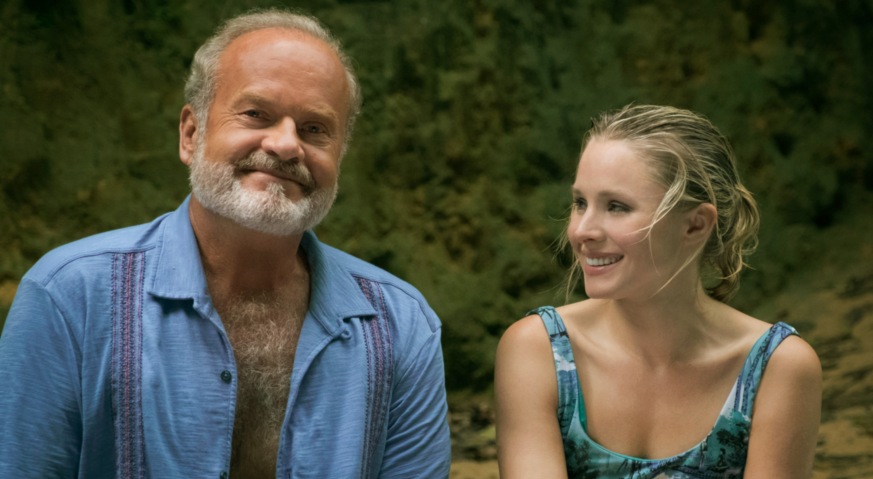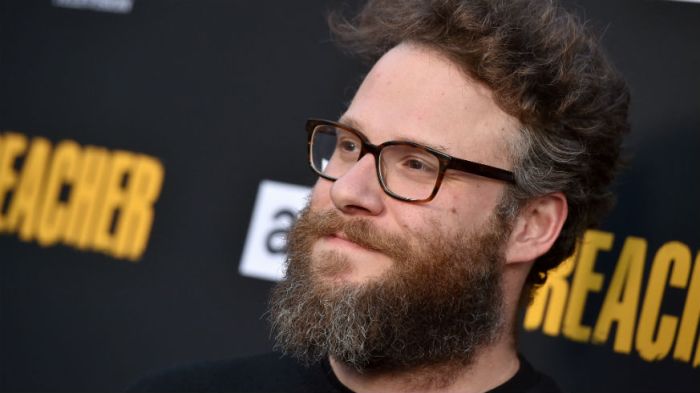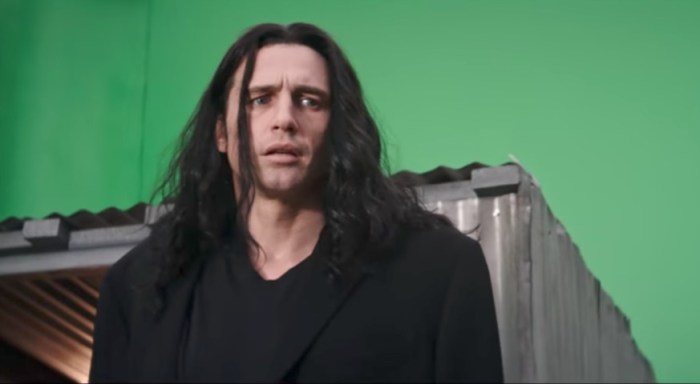Never has the word dramedy been more applicably used than to describe Like Father.
Just as amusing as it is dramatic and poignant, too, the latest Netflix release sees Kristen Bell play an overworked businesswoman who is left at the altar, while Kelsey Grammar is her estranged father that picks the ceremony to reunite.
The next day, over several shots of whiskey, the pair see eye-to-eye, only for Bell’s Rachel to drunkenly invite her pops on her honeymoon cruise, a decision she instantly regrets.
I recently had the chance to speak to “Like Father’s” writer, producer and director Lauren Miller Rogen about the film, during which time she talked me through mixing her depression with humor, her ambition to create a modern comedic female character, and finally giving her husband Seth Rogen the chance to play a Canadian.
When did you start work on “Like Father”?
I am actually started writing it 6 years ago. It was pitched by Anders Bard, one of the producers on the movie, and he just had the kernel of the idea. Woman who is left at the altar, who is estranged from her dad, he shows up, and they end up on a honeymoon cruise together. Although neither of those things happened to me in real life, I was just really interested in creating a story about a woman that goes through the emotional circumstances that that situation would create. Was just realized interested and fascinated by that. It took me close to 2 years to finish the first draft of the script. Because although I thought that would be easy, it turned out to be much harder than I anticipated. I did close to 17 drafts of the first 20 pages. But then once I figured that out and went from there it was easier to figure out. But, yeah, close to 6 years to write the script.
What were some of the obstacles you encountered when writing it then?
Well, there were a few obstacles. One, which every writer faces, was just, ‘What should happen?’ There were a few first ideas I had that made her much more basic and broad and generic. There was a version of, ‘Oh, she is getting married to replace the dad that left her.’ I was like, ‘No, that’s gross. I don’t want to tell that story.’ So I had to work through all of the bad ideas. Then another obstacle, which was an obstacle at the time, but in retrospect actually became a strength, I was honestly going through quite a dark time in my own life. My mum had Alzheimer’s disease, and that was just at the very beginning of when the disease was getting very advanced. That was part of why it took me so long. Because I was really depressed and really angry and really sad. So I couldn’t always work. But now I can see how that really influenced the writing and how it helped ground the emotional moments in what I hope is a real way. The tone I think came from that time of my life. Because I have a lot of fun moments, I live with a comedian, I have funny, comedic friends, I go to crazy events sometimes. And I am like, ‘What is my life?’ But then I go home and have to deal with a lot of s*** that everyone has to deal with. Losing my mum to this disease has been horrific for me and my entire family. I feel like that balance of highs and lows, and dramedy, is what the movie became. At the time I felt like those feelings were always slowing it down, but I actually think that is what made the movie have its grounded emotional tone. Now I am thankful that I went through it while writing it. It was something that I literally didn’t even realize that I had done until I was in the editing room. Then I was like, ‘Oh, right. This tone is exactly my life. I did write what I knew. Even though I have never been left at the altar, I did actually write my emotional story.’
What were your influences when you wrote the film then?
I am very much inspired, I mean, I love Alexander Payne. “The Descendants” is a really inspiring movie for this. Perhaps not quite as comedic as “Like Father” is. Sideways even. Nicole Holofcener makes movies that are very inspiring to me. I always feel like she creates these very real women that feel three dimensional and are so relatable. “Parenthood” is a movie that has always influenced me greatly as a writer. I feel like it is such a dramedy. It is such a funny movie, but damn is it sad and emotional. Don’t get me wrong, I still saw Mission: Impossible on Friday and I absolutely loved it. But those are the types of movies that really get me.
Are you very strict with hitting beats when you are writing? Or do you let it develop organically?
No, I let it breathe a little. Don’t get me wrong I have an outline that I stick to. I will watch the outline and plots of movies, and see that they hit a certain plot point here and there. But I don’t stick to that too much. I feel like as an actor; I took a class a long time ago called improv for writers. And I feel like that was something, you know, I really enjoy writing dialogue. I will sit there and just have the voices in my head. And go back and forth and I will have these little conversations. I feel like that informs what comes next. It is almost like improv in my head in a way. Every draft you learn something. When I first started every scene was so descriptive, everyone said things, but you learn over time to just feel what you need on the page. I will edit in my head before I type on the page sometimes. Which makes me go slower than I want. But it something that has just developed over time. But every different writer has a different process.
So when you are directing do you stick with the script?
No, I am not very strict at all. It is very important for me to get the beats. But we did stick to the script very closely. When both Kristen and Kelsey came on-board I made little tweaks here and there, and they both had instinctual ideas that were really spot on, which was why I cast them. Because they really got it. But it would be minor tweaks here and there. Always the night before I shot I would tweak and add, too. Because I was really hearing the voices in my head and I had seen these characters come to life. All of which would drive my AD crazy. We would improvise a little bit. But, to be honest, we didn’t have time for it. We were on a pretty tight schedule. If I had more time, we would have done more. But because we were moving as fast as we could we couldn’t. But there is some in there.
Talk about working with Kristen Bell and Kelsey Grammar then. Who did you cast first?
It was actually Kelsey first. It is a funny story. I think I had finished the script and I was just starting to send it around a little bit. And they were shooting “Neighbors 2,” which Kelsey actually has a small part in. He plays Chloe Moretz’s dad. And I didn’t meet him, but I was on set the day he shot his scenes. And he was so unbelievably funny that I immediately pictured him as Harry. I wanted to cast someone who hadn’t done that role before. Then I sat down with him, and we were talking about one of the emotional scenes with Gabe, and he started to tear up. Which I found amazing. He just got it. He has lived such an incredible life that, and these were his words, he has so many wells to pull from emotionally. He is just so willing to go there and so brave. It was just amazing to watch him work. Kelsey was on board first, and then with Kristen we have a mutual friend. We kind-of sort-of knew each other, but not really. So we sent the script to her, and I told my friend to tell her that I am a normal human being, so she should read it. I had seen her be funny and be dramatic, but not something quite like this before. So I wasn’t quite so sure. But from the moment we were sat down I could tell that she was just perfection across the board. The thing I feel like I didn’t know was how amazingly smart and intellectual she is. When I wrote Rachel I wanted to write a woman who is three dimensional and felt like a real person, whose emotions would feel balanced with how women really emote. And Kristen was immediately on that same page. I feel like from the first moment we sat down we started to talk about how to make Rachel feel like a real person. Because, over a handful of movies, we are making women more than two dimensional. So whether it was a funny scene or an emotional scene we would be like, ‘Think of Rachel. If she was a real woman, how would she be reacting?’ I feel like I just learned so much through working with her.
What did you want to achieve with Rachel?
Don’t get me wrong there have been so many tremendous female characters in the history of cinema. I don’t want to discount the many incredible female characters. However, there are some female characters that I can’t say I have admired. I feel like, especially, in the dramedy category, women became a little two dimensional. They weren’t allowed to have real feelings. They weren’t allowed to get angry. They had to be naggy. They were clumsy and that is what made them adorable. They just sort of became sweet and sugary and if a real woman emoted it wasn’t allowed. When I watch something I want to be able to connect in some way. With Rachel I wanted people to say, ‘F*** yes that is how I would react in that situation. Of course she should be angry with him. And of course she should be allowed to blow off steam if she wants to.’ I wanted her to go through this emotional journey to find herself, but really takes some hard steps along the way.
Finally, how was working with Seth? What was the best piece of advice he gave you?
I mean, it was fantastic. When I made my first movie, “For A Good Time Call,” which I did not direct, he gave me the best advice, which is, ‘Whether you are the lead actor, the director, or even the producer, your first job on set is to be in a good mood. It is to show everyone that there is no place else you would rather be.’ That’s something I always tried to remember. But the truth is I worked really hard to get there. So I should be happy to get there. So that was the number one advice that I remembered. But, otherwise, I am just fortunate that the person that I trust the most just so happens to be a really talented filmmaker. So I was really happy to have him around. He would give me advice when I asked for it, but he also respected that I knew what I wanted, had a vision, and was able to do that. It was really fun. I didn’t write that character for him at all. Seth was originally going to play Owen the groom at the beginning. But then we were in Canada, like 2 months before shooting, and we were brushing our teeth and, the character was original supposed to be from the Mid-West, but I said, ‘Maybe Jeff should be from Canada? Then I can make Canada jokes.’ His response was, ‘I am not going on a cruise ship.’ I was like, ‘I didn’t say that.’ But over the next few days we came up with so many funny tidbits, and he had never played Canadian before, and he wanted to make those jokes. It got to a point where he was like, ‘Right, I have to do it. It will be too funny.’ So on the ship he went.
“Like Father” is released on Netflix on August 3rd





















